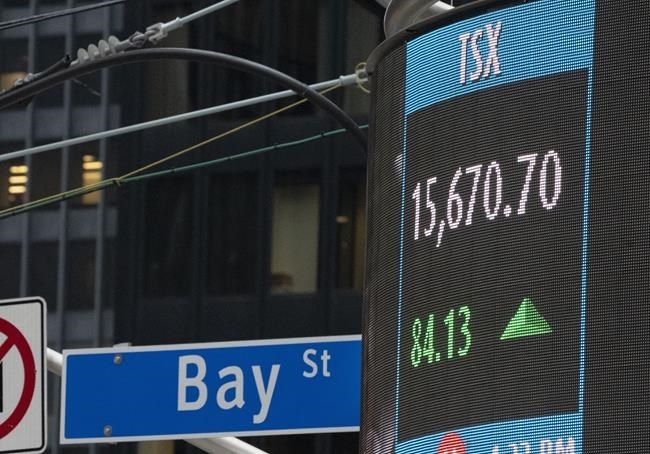TORONTO — Canada's main stock index followed Tuesday's steep losses by losing more ground at closing as higher bond yields continued to drag down the technology sector and offset continued energy gains.
The market was in positive territory for much of the day amid a relief rally after steep declines a day before, said Candice Bangsund, portfolio manager for Fiera Capital.
But the situation turned sour near the end of trading as the S&P/TSX composite index closed off 16.00 points to 20,158.14 after hitting an intraday high of 20,275.34.
The situation was mixed in New York. The Dow Jones industrial average was up 90.73 points at 34,390.72. The S&P 500 index was up 6.83 points at 4,359.46, while the Nasdaq composite was down 34.24 points at 14,512.44.¬Ý
On Tuesday, markets felt the effects of a sharp increase in U.S. bond yields that especially punished the technology sector.
Despite dipping slightly on Wednesday, bond yields remained above 1.5 per cent and placed continued pressure on the sector which lost 1.8 per cent.
Lightspeed was the big laggard on Wednesday. Its shares plunged 11.7 per cent after American short-seller Spruce Point claimed the Montreal-based company was exaggerating the size of its potential market and hiding the decline in its activities through successive acquisitions.¬Ý
"Lightspeed is attracting investors with the enormous potential of its payment solutions, but we believe it has not been transparent about competitive pressure and a significant decline in its margins," Spruce Point founder Ben Axler wrote in a report.
Short sellers bet against a stock's performance and profit if the share price falls.
Spruce Point argues the competition is increasing against Shopify and Amazon and that Lightspeed will ultimately "lose" the fight as the stock trades at an "astronomical" multiple of 23 times analysts' sales forecast for 2022.¬Ý
Materials, health care and consumer discretionary were also lower on the day. Materials dipped on lower metals prices with shares of Labrador Iron Ore Royalty Corp. losing 7.7 per cent for a second day of steep declines.
The December gold contract was down US$14.60 at US$1,722.90 an ounce and the December copper contract was down 4.75 cents at US$4.20 a pound.¬Ý
The bright spots on the TSX were consumer staples and energy.
Energy gained one per cent despite lower crude oil and natural gas prices.
The November crude oil contract was down 46 cents at US$74.83 per barrel and the November natural gas contract was down 40.3 cents at US$5.48 per mmBTU.¬Ý
Oil and natural gas prices have been on a strong run in recent months. Crude has surged 20 per cent in five weeks and 54 per cent so far in 2021. Natural gas price gains have been even more dramatic. Even after Wednesday's drop, prices were up 42 per cent since Aug. 20 and 56 per cent year-to-date.
"There's just a lot of positive momentum in the energy space. We've seen such a powerful rally in crude prices over the last few months here," Bangsund said in an interview.
"This is a powerful tailwind for energy companies that have lagged in the broad global equity market rally. So I think this is just a momentum play in the energy space."
The November crude oil contract was down 46 cents at US$74.83 per barrel and the November natural gas contract was down 40.3 cents at US$5.48 per mmBTU.
Vermilion Energy Inc. shone brightest on the day, gaining 9.6 per cent.
The Canadian dollar traded for 78.49 cents US compared with 78.86 cents US on Tuesday.¬Ý
Even though the historically challenging month of September comes to a close on Thursday, Bangsund expects an extended period of volatile trading conditions ahead.
"Sentiment is fragile right now given some of the risks that have emerged on the macro front," she said, pointing to signs of a slowing global economy, regulatory and economic upheaval in China and the impending tapering of stimulus by the U.S. Federal Reserve.
"So this leaves equity markets vulnerable or susceptible to disappointment and some near-term volatility."
This report by The Canadian Press was first published Sept. 29, 2021.¬Ý
Companies in this story: (TSX:LIF, TSX:VET, TSX:LSPD, TSX:SHOP, TSX:GSPTSE, TSX:CADUSD=X)¬Ý
Ross Marowits, The Canadian Press

